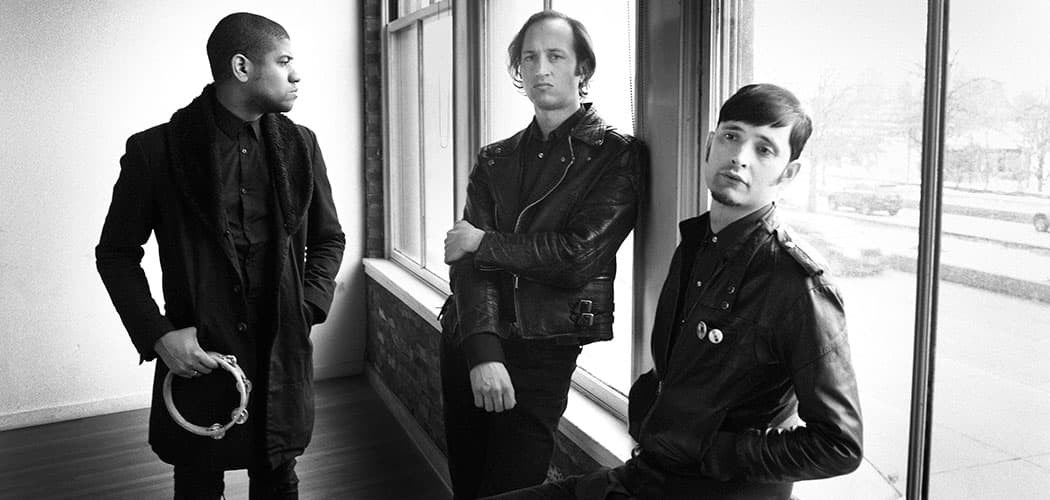Advertisement
Algiers Reclaims The Black Roots Of Rock And Protests The World’s Troubles

The most radical thing about the political rock band Algiers may be their ability to manifest grief. The group, whose three members hail from Atlanta and now live in London and New York, makes protest music rooted in gospel and punk. (They perform at Brighton Music Hall in Allston on Sept. 17.) Vocalist Franklin James Fisher sings with raspy defiance, by turns livid and mournful. He almost seems to spit with rage in the song “Irony. Utility. Pretext.”: “You put your hand out to shake/ And they export you in chains.” But pervasive throughout Algiers’s self-titled debut is a sense of anguish, an unwillingness to look away from pain or cloak it in uplifting platitudes.
“History tells us that, for most people on this earth, it’s a very sad existence, in terms of political experience and livelihoods,” says bassist Ryan Mahan. But, he adds, “It’s not nihilistic. You know, one of the books that really touched me when I was younger was ‘The Plague’ by Albert Camus. And the fact that you got to the end of the world, but rather than eating each other alive, like we’re told will happen if capitalism collapsed, there’s a sense of humanity that emerges, a sense of common shared recognition of this grief, of this ending. Maybe an acceptance, but also a willingness to say that despite all this we’re still going to push towards some future.”
Anyone familiar with Algiers’ music will be unsurprised at a casual reference to a French existentialist’s novel about a plague that nearly destroys a city. The band’s Tumblr account is a collage of critical race theory and anti-capitalist musings. There are links to writings by the African-American novelist and critic James Baldwin and articles about the Black Panthers alongside photographs of admired musicians, from John Cage to Kim Gordon to Nina Simone.
“Growing up in the South and being told of our history and then seeing it laid bare before us, in segregation and racial violence and racism, being privy to those direct forms of racism, obviously has an impact,” says Mahan.
Algiers depict racial prejudice not as simple bigotry but as something more insidious, a symptom of a broken system. In the foreboding “But She Was Not Flying,” racism is part and parcel of a democracy poisoned by capitalism: “There’s a lizard with a human face/ He says he’s standing for democracy ... Deciding who is fit to go out and die/ And who is black enough to be left behind.” In “Blood,” slavery is just another violent historical legacy to which a media-obsessed culture turns an apathetic eye: “Four hundred years of torture/ Four hundred years a slave ... So drown in entertainment/ ‘Cause all our blood is in vain.”
Algiers’ music tells a similar story to their lyrics. The songs are built around samples of Fisher’s voice, a mournful gospel chorus that, thanks to the distortive effects of technology, seems to rise like a ghost from an ancestral grave. Lee Tesche’s guitar doesn’t so much sing as it hisses, rumbles and shrieks. (Many of the songs use prepared guitar, a technique in which the instrument is outfitted with foreign objects to produce strange and percussive noises.) The sounds in Algiers’ songs are at once alienating and familiar, and a statement in and of themselves.
“We grew up in the ‘90s, at a time where a lot of pop culture, pop music was as far away from its source or its origins as it could be,” Mahan says. “So if you’re talking about rock ‘n’ roll moving quite far away from its origins in African music and its origins in soul music and its origins in gospel music. So I think there’s an element of re-associating, clearly and on the face of our music ... with the actual source of the music.
Advertisement
“And that can be a very political move,” he adds. “Because that’s also engaging with the social circumstances that are repressed through the mechanisms of culture, through the mechanisms of power, through the mechanisms of pop culture, and also just by who benefits most from appropriation.”
“Irony. Utility. Pretext.” takes on some of these ideas directly: “We put our faith in Afro Pop/ In a decolonized context/ Espouse the aesthete’s contempt for ethos/ Irony. Utility. Pretext.” But for the most part, Algiers’ songs eschew academic jargon. You need only to hear the ache in Fisher’s voice, the ferocity in Tesche’s playing, to locate the heartache at the core of their political discontent. For Algiers, there is no clearer, more righteous expression of protest than the one told in song.



